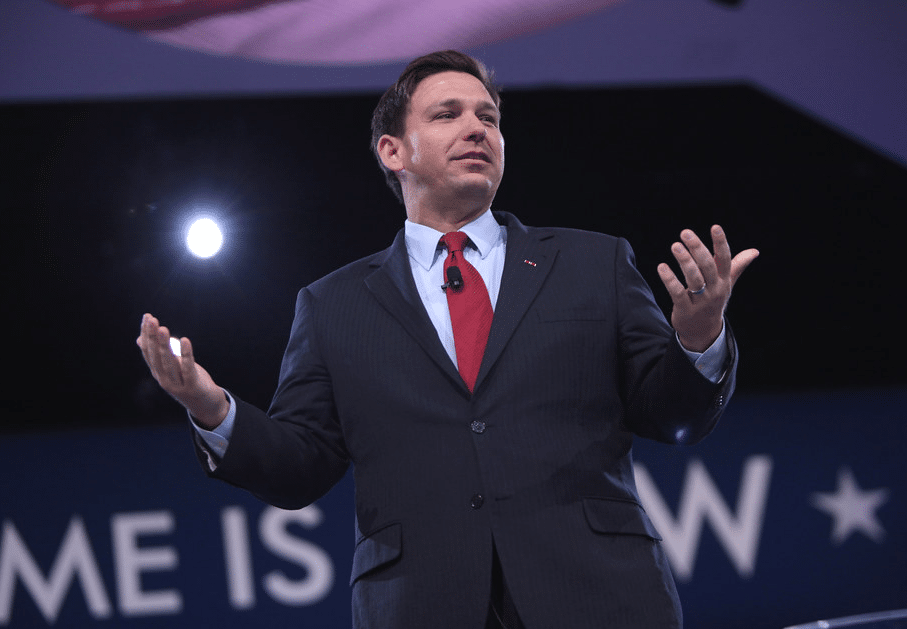Florida Governor Ron DeSantis has reiterated his warning that the election of Vice President Kamala Harris as president would result in economic policies that could precipitate the next “depression.”
DeSantis strongly condemned Harris’ strategy to reduce escalating food prices through the prohibition of price gouging, labeling it a clear “lie.” He contended that her method fails to address the underlying issues of supply chain disruptions and the significant quantities of money that have been printed and borrowed. Additionally, he expressed his belief that Harris’ policies might drive the nation “into a depression.”
Supply chains are facing disruptions, and there is a significant increase in the printing of money, which has resulted in substantial consequences, he stated during a press conference in Bradenton on Friday morning, as reported by The Floridian. He was alluding to the nation’s debt of $35.27 trillion and the projected money printing order for 2025, estimated to be between $83.2 billion and $113 billion.
“Harris was there for this—she cast the vote for some of these major spending initiatives that really fueled inflation,” he added.
Harris has observed that the current inflation rate in the United States stands at 2.5%, marking the lowest level since March 2021. Nevertheless, prices remain more than 20% elevated compared to their levels at the onset of the pandemic in February 2020, suggesting that while the rate of increase has slowed, prices continue to rise.
For instance, during the Biden-Harris administration, food prices have surged by 20%, a rise that the Vice President attributes to corporate price gouging.
“That is a lie,” DeSantis countered. “The reason why grocery prices have gone up is because of supply chain disruption from the COVID nonsense and the massive amounts of printing and borrowing of money. It’s effectively like a major tax on people—it’s just invisible.”
The Floridian added:
“The pandemic, later coupled with the 2022 Russian invasion of Ukraine, caused a global supply chain crisis. Chemical supplies, automotive sector shipments, and technology distribution sharply dropped—disrupting consumer patterns and damaging various countries’ economies. So, when the U.S. started to experience rocketed inflation, Harris in 2022 cast the tie-breaking vote in favor of the Inflation Reduction Act, which received zero GOP support. The $740 billion law was packaged as an investment in creating various jobs, lowering energy and medical costs, and cracking down on wealthy tax evaders, though Republicans have argued that it’s a misnomer that actually increased inflation. DeSantis, meanwhile, turned to the Federal Reserve on Wednesday cutting its key interest rate for the first time in four years to lower borrowing costs on everything from mortgages to credit cards, CNN reported. The Florida Governor, however, was skeptically hesitant to discuss the nation’s economic future, even with the Fed’s slashed rates.”
He holds the Biden-Harris administration responsible for that.
“They’ve botched this from the beginning of COVID, and so they’re kind of the reason we’re in the mess, in addition to the Congress and the borrowing and spending,” he said. “If you get someone like Harris [who] tries to tax unrealized gains, this country will go into a depression. You’d see a massive flight of capital out of the United States, and I think that would hurt our state in particular.”
“It’s a lunacy to say you’re going to tax someone’s investment before they’ve even realized a profit on it—they just have to cut a check,” DeSantis said.
The aforementioned gains arise when the value of an individual’s property, stocks, or assets, which have not yet been liquidated, appreciates. According to the proposed plan, individuals with a net worth exceeding $100 million would incur a tax of 25% on that appreciation. DeSantis characterizes this proposal as “Orwellian,” contending that it would affect all Americans, not solely the affluent. During a prior press conference, he compared her economic strategies to the act of arson, questioning, “Would you bring in the arsonist to extinguish the fire?”

